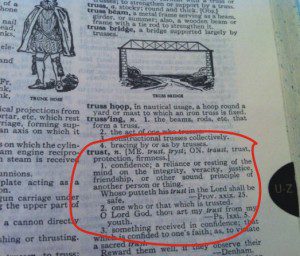 Trust is a powerful word. From the Merriam Webster dictionary definition:
Trust is a powerful word. From the Merriam Webster dictionary definition:
belief that someone or something is reliable, good, honest, effective, etc.
a) assured reliance on the character, ability, strength, or truth of someone or something
b) one in which confidence is placed
Webster’s Unabridged 1983 to the right, (click for a larger image) uses biblical references as illustrations of the word in context: Whoever trusts in the Lord is kept safe (Prov. 29:25) and For you, O Lord, are my hope, my trust, O Lord, from my youth (Ps. 71:5).
As Christians we tend to emphasize head knowledge – belief in the correct doctrines and dogmas. But the most important Christian attitude is one of trust. We trust in the Lord because he is trustworthy.
Trust in the Lord with all your heart, and do not lean on your own understanding.
In all your ways acknowledge him, and he will make straight your paths.
(Prov. 3:5-6)
In that day this song will be sung in the land of Judah:
…
Trust in the Lord forever, for the Lord God is an everlasting rock. (Is 26:4)
“Blessed is the man who trusts in the Lord, whose trust is the Lord.
He is like a tree planted by water, that sends out its roots by the stream,
and does not fear when heat comes, for its leaves remain green,
and is not anxious in the year of drought, for it does not cease to bear fruit.”
(Jer. 17:7-8)
Pete Enns is featured in an excellent video from Eastern University.
https://vimeo.com/174400229I’ve found that trusting God is so central and important to the way we live the life of faith. … See, when we use the word believe we use words like what do you believe in or I believe that. Trust is different. Trust is a who word.
Watch the whole video – four minutes well spent.
What does it mean to trust in the Lord?
In what ways do we try to put our trust in something other than the Lord?
What is the result?
We can put our trust in a political system. (Hard to do this year.)
We can put our trust in a theory of the inspiration of Scripture.
We can put our trust in pastors and Christian leaders.
But none of these equate to trust in the Lord.
We can believe a set of propositions.
I believe in God, the Father almighty, creator of heaven and earth.
I believe in Jesus Christ, God’s only Son, our Lord, who was conceived by the Holy Spirit, born of the Virgin Mary, suffered under Pontius Pilate, was crucified, died, and was buried; he descended to the dead. On the third day he rose again; he ascended into heaven, he is seated at the right hand of the Father, and he will come to judge the living and the dead.
I believe in the Holy Spirit, the holy catholic Church, the communion of saints, the forgiveness of sins, the resurrection of the body, and the life everlasting. Amen.
But this also, doesn’t equate to trust unless we think long and hard about what “believe” means.
In Simply Christian NT Wright writes:
The gospel—the “good news” of what the creator God has done in Jesus—is first and foremost news about something that has happened. And the first and most appropriate response to that news is to believe it. God has raised Jesus from the dead, and has thereby declared in a single powerful action that Jesus has launched the long-awaited kingdom of God, and that (by means of Jesus’s death) the evil of all the world has been defeated at last. When the alarm clock goes off, this is what it says: “Here’s the good news. Wake up and believe it!”
This message, though, is so utterly unlikely and extraordinary that you can’t expect people simply to believe it in the same way they might believe you if you said it was raining outside. And yet, as people hear the message, at least some find that they do believe it. It makes sense to them. … Ultimately, believing that God raised Jesus from the dead is a matter of believing and trusting in the God who would, and did, do such a thing.
This is where our word “belief” can be inadequate or even misleading.What the early Christians meant by “belief” included both believing that God had done certain things and believing in the God who had done them. This is not belief that God exists, though clearly that is involved, too, but loving, grateful trust. (pp. 206-207)
The Lord we trust is the Lord we believe in.
If you wish to contact me directly you may do so at rjs4mail[at]att.net
If interested you can subscribe to a full text feed of my posts at Musings on Science and Theology.











